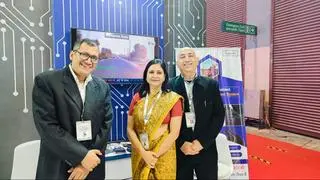This is the story of how Bryan Lee, a third generation Chinese American, who aspired to become a rocket scientist, became a social entrepreneur in India, helping small and marginal farmers earn more for their produce. Bryan studied mechanical engineering at Cornell, and then joined a consulting firm in New York, where he learnt a lot about business, strategy, marketing and the like.
He realised that Asian Americans were not getting their due recognition in the US and soon quit Accenture and joined a records label company that was promoting Asian-American artists, where he worked for eight years. A management degree at Kellogg followed, where the focus was on social entrepreneurship. During his MBA, he got an internship opportunity in India, with a company called I-Farms. During this period, Bryan says he interacted with small and marginal farmers in Haryana, Punjab, Chhattisgarh and Uttar Pradesh.
The trigger point
Bryan says this experience was an eye-opener for him. He realised that the small farmers were caught in a vicious cycle and that theirs was not a good economic position to be in. They were farming a commodity and doing it in a small scale that there was very little chance of being profitable. “I decided at the end of the internship that I wanted to come back to India, build a business and work with small farmers,” says Bryan.
He graduated in 2012 and very soon landed in Mumbai, where he launched Krishi Star, a social enterprise that is creating a network of farmer-owned processing units and selling their products – mainly processed tomatoes and mushrooms – under the Krishi Star brand to restaurants and hotels in Mumbai, Pune and Goa.
Krishi Star itself came into being in 2014, after Bryan and his team spent time figuring out what they wanted to do and discussing various models.
Bryan, 40, recalls a farmer in Maharashtra telling him that generation after generation, the problems of farmers remained the same. That despite several schemes and many NGOs in the space, the farmers’ problems of poor income, continuing poverty and uncertainty remained unsolved. Bryan said his idea was to shift the rural economy, “can you create an economy that wasn’t based on farmers’ harvest.” That is why they decided to work in the processing sector, which, says Bryan, is counter-cyclical. Processing the produce also involves farmers in an allied part of farming, one that hedges his or her risk.
According to Bryan, they also came across a number of food processing units where capacity utilisation was low. The farmer-owned units were also saying that they were not able to sell their produce. That is when Bryan decided that Krishi Star would use the unutilised capacity in these processing units, work with the farmers to ensure quality of their produce – mainly tomatoes and mushrooms – get them processed at the units, brand them and sell them. The farmers are assured of a fair price, the processing units get their income and their capacity utilisation increases, and Krishi Star makes a healthy trading margin. Krishi Star sells tomato paste, tomato puree, sun dried tomatoes, whole peeled tomatoes and dried oyster mushrooms. A little bit of the branded products go to Delhi, Baroda and Surat.
According to Bryan, Krishi Star engages with close to 400 farmers, but this number can go up if they work with a processing unit that is owned by a large number of farmers. The company has just started procuring directly from farmers in Maharashtra.
Expansion plans
Bryan says they have raised about ₹1 crore so far in two rounds from various investors and the company is looking to raise about ₹2 crore now. It plans to sell its produce in Bengaluru and Chennai this year and also expand in Delhi. Krishi Star was one of the pitch finalists at the Andhra Pradesh AgTech summit in 2017. It will shortly sign an agreement with the Andhra Pradesh Government for the supply chain.
“We will concentrate on growing in the B2B segment. We are white labelling our products for some of the online retailers. Our products are available in retail, but not under our brand name,” says Bryan, on whether it will sell directly to consumers.
How has his experience been of running a venture in India? “It has been a mixture of the good with the bad,” says Bryan, sitting in his small shared office in Mumbai’s Sewri area. “In some ways it has been difficult. There are some administrative things that have been difficult. But in terms of openness to new ideas, in terms of partnerships, it has been good,” he says. Also, the ecosystem is encouraging – there are a lot of mentors, investors are willing to listen to your idea and there are enough people willing to try the product from a new company. “I don’t feel stifled. I think it is a good place to start a business,” adds Bryan.








Comments
Comments have to be in English, and in full sentences. They cannot be abusive or personal. Please abide by our community guidelines for posting your comments.
We have migrated to a new commenting platform. If you are already a registered user of TheHindu Businessline and logged in, you may continue to engage with our articles. If you do not have an account please register and login to post comments. Users can access their older comments by logging into their accounts on Vuukle.